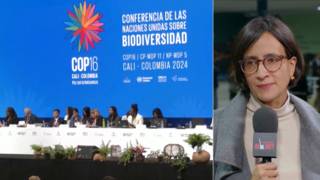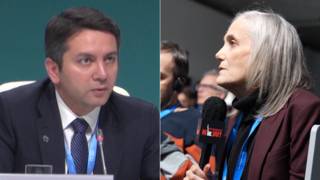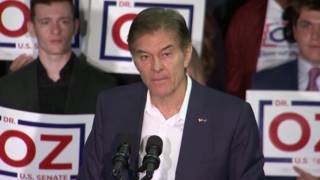
Related
Guests
- Raymond Offenheiserpresident of Oxfam America. He has been visiting Oxfam’s refugee program in Jordan and Lebanon, and joins us live from Beirut.
While Washington debates the use of military force in Syria, the United Nations has revealed the number of refugees who have fled the country’s civil war has topped two million, with another four million internally displaced. The tide of children, women and men leaving Syria has risen almost tenfold over the past 12 months. On average, almost 5,000 people take refuge in Syria’s neighboring countries every day. The United Nations warned last month that the war is fueling the worst refugee crisis since the Rwanda genocide in 1994. Overall, the fighting in Syria has killed more than 100,000 since 2011, including some 7,000 children. In Beirut, Lebanon, we’re joined by Oxfam America President Raymond Offenheiser, just back from visiting refugee camps in Jordan and Lebanon.
Transcript
NERMEEN SHAIKH: The Senate Foreign Relations Committee is preparing to vote as soon as today on a draft authorization for the use of military force in Syria. The resolution sets a 60-day limit on U.S. military action in Syria, with a possible 30-day extension. On Tuesday, Secretary of State John Kerry testified before the Senate Foreign Relations Committee saying Syrian President Bashar al-Assad must be held accountable for his alleged use of chemical weapons against civilians.
SECRETARY OF STATE JOHN KERRY: If the United States of America doesn’t hold him accountable on this, with the—with our allies and friends, it’s a guarantee Assad will do it again. A guarantee. And I urge you to go to the classified briefing and learn that. Secondly, let me just point out to you that with respect to this question of Americans wanting to go to war, you know, you’ve got three people here who have been to war. You’ve got John McCain, who’s been to war. There’s not one of us who doesn’t understand what going to war means, and we don’t want to go to war. We don’t believe we are going to war in the classic sense of taking American troops and America to war. The president is asking for the authority to do a limited action that will degrade the capacity of a tyrant who has been using chemical weapons to kill his own people.
AMY GOODMAN: Secretary of State Kerry testifying before the Senate Foreign Relations Committee. While the Senate’s draft resolution includes a provision barring the use of U.S. troops on the ground, Kerry admitted there are some scenarios when the president might decide to send troops into Syria.
SECRETARY OF STATE JOHN KERRY: In the event there was a threat of a chemical weapons cache falling into the hands of al-Nusra or someone else, and it was clearly in the interests of our allies and all of us—the British, the French and others—to prevent those weapons of mass destruction falling into the hands of the worst elements, I don’t want to take off the table an option that might or might not be available to a president of the United States to secure our country.
NERMEEN SHAIKH: John Kerry later walked back his comments on committing U.S. troops, saying the White House has no such plans. The New York Times, meanwhile, reports at least 50 CIA-trained rebels have now crossed into Syria from Jordan.
Meanwhile, this weekend, Pope Francis called for peace in a message delivered at Saint Peter’s Square. He called for Friday to be a day of fasting and prayer for Syria and said, “War begets war, violence begets violence.”
POPE FRANCIS: [translated] With all my vigor, I exhort the international community to make every effort to promote clear proposals for peace in that country without further delay, a peace based on dialogue and negotiation, for the good of the entire Syrian people.
AMY GOODMAN: Pope Francis speaking in Saint Peter’s Square. President Obama goes to Saint Petersburg, Russia, with a very different message. And that’s the issue that is in Washington right now as it debates the use of military force.
The United Nations has revealed the number of refugees who have fled Syria has topped two million. The tide of children, women and men leaving Syria has risen almost tenfold over the past 12 months. On average, almost 5,000 people take refuge in Syria’s neighboring countries every day. The U.N. warned last month the war is fueling the worst refugee crisis since the Rwanda genocide in ’94. Two million refugees have fled Syria, half of them to neighboring Lebanon. Jordan hosts over 500,000, and there are tens of thousands in Turkey. Overall, the fighting in Syria has killed more than 100,000 people since 2011. More than 7,000 children have died.
For more, we’re joined by Raymond Offenheiser, president of the international relief and development organization Oxfam. He’s been visiting Oxfam’s refugee program in Jordan and Lebanon, and joins us now from Beirut, Lebanon.
Raymond Offenheiser, welcome to Democracy Now! Can you talk about the situation right now, since President Obama has pushed for a military strike against Lebanon? How has that—against Syria? How has that affected the refugee crisis?
RAYMOND OFFENHEISER: Well, thank you very much, Amy. It’s good to be with you.
We’ve been here for the last four days, basically, visiting the refugee camps in Jordan and all the improvised settlements that refugees are finding themselves in through both—through both Lebanon and Jordan. And I don’t know that there’s been an immediate reaction. There’s an enormous sense of expectation here in the region about what this action may mean and whether in fact it will trigger greater refugee flows across the border. I think, at this point, there isn’t necessarily the perception that the flows are increasing dramatically, but that—you know, we don’t know what will happen if in fact a strike does in fact occur.
That being said, I think the point you made earlier about the scale of this emergency, the fact that we’re talking about two million refugees outside the borders of Syria, and we’re talking about really some six or seven million IDPs or personnel that are moving around in Syria that are not properly housed, that are in need of humanitarian assistance, this is an enormous emergency. And much of that population we can’t reach, because they’re inside the borders of Syria right now in the midst of the conflict.
NERMEEN SHAIKH: Well, Raymond Offenheiser, you’ve just been visiting these refugee camps in Jordan and in Lebanon. Can you describe what you have witnessed of the situation of these refugees?
RAYMOND OFFENHEISER: Well, there’s of course the big camp, Zaatari, on the Jordan-Syrian border, which I think has gotten a lot of press and a lot of coverage. There’s 120,000 refugees in that one camp. But that’s really the only one large camp that exists in either Syria or Lebanon of that scale. It’s the fourth-largest city now in Jordan. There are some—half the residents of that are children. Some 60,000—of 60,000 children in that camp, only 15,000 of them, for example, are in school at the present time. They’re living in a combination of tents or small wooden-frame structures. The camp is, I suppose you might say, in reasonably good order, but that belies the fact that many other refugees are making their way into Lebanon and Jordan and trying to find improvised housing in tents in the middle of fields. Others are trying to find very affordable apartments in Amman and other cities or towns. And if you can imagine that only 120,000 of 500,000 of these refugees, in the case of Jordan, are in this camp, the rest of them are putting an enormous strain on municipal services, on the education system and the health system in Jordan, and similarly here in Lebanon.
AMY GOODMAN: Can you talk about the effect that the announcement of the possible strike is having on people in Syria and the refugees you are speaking to in Lebanon and Jordan?
RAYMOND OFFENHEISER: Well, I can’t speak to Syria, because I haven’t been inside the country, and it’s been very hard to kind of get any sense of what things look like or how people are feeling there. I think there’s a sense of—high sense of anxiety. And if you’re watching the local cable news networks here, you can sense that because it’s being reported and speculated on really 24/7.
Within the camps themselves, I think there’s sort of an expectation that something dramatic is going to happen. I think that a lot of the people think that this is the beginning of a much more dramatic action on the part of the United States, and perhaps the international community, than the sort of surgical strike that perhaps the president has been describing.
I think what’s really clear in the minds of the refugees is they want to go home. They want to go home now. And they are really looking for some sort of a solution, any solution that will really end this conflict and allow them to go home, and are really worried that we’re looking at a conflict that could be going on for months, if not years, having them having this enormous two million population outside the country and the IDP population in the country literally vulnerable for months and years to come. And that’s not—I don’t think that’s an acceptable situation. It’s not an acceptable status quo. And I think we’ve got to really move toward driving toward some sort of political solution to end this conflict.
NERMEEN SHAIKH: So, Raymond Offenheiser, what exactly is Oxfam calling for? What do you think the U.S. should be doing now, and international community?
RAYMOND OFFENHEISER: Well, we’re deeply—as a humanitarian organization, we condemn the use of chemical weapons and indiscriminate killing of civilians. We’re very concerned about the protection of civilians in all of these contexts. That’s what our mission is about. That’s what we’re doing here now. And we recognize, along with the rest of the international community, that the use of chemical weapons is prohibited by international law, and it’s prohibited by the rules of law, and that’s been the case since World War I.
That being said, we also recognize there’s a need for some strong and immediate action. But we’re not sure that military action is the answer. I think there’s—it’s pretty clear that when you strip away all the rhetoric about the military strike, that there is agreement between the Russians and the Americans and the Vatican and the Arab League about the fact that at the end of the day this is going to require a political solution. Our concern is that a military strike basically would likely—offers the potential of widening the conflict, turning it into a wider regional conflict, inflicting the potential for more civilian casualties, undermining the trust that’s needed to get us a political dialogue going, and prolonging the conflict in ways that are not necessary.
So, this is not to say that Oxfam has never in the past called for the use of military force to end a conflict that has been out of hand, and we’ve called for it as, you might say, a last-resort measure in Rwanda, the Congo and in Liberia. But in this particular case, we don’t think that this meets the six criteria we might use to make a judgment about whether in fact this is appropriate or not. We think this is a moment in which the president in Saint Petersburg today, or at the start of the G-20 talks, ought to be trying to pull the international community together and start that political dialogue and restart the Geneva talks.
AMY GOODMAN: And the issue of government—of U.S. support for aid for Syria, humanitarian aid, is this an issue for Oxfam and other groups?
RAYMOND OFFENHEISER: Well, I think that the U.N. has made an appeal for humanitarian aid that is quite substantial, and only about 30 percent of that has been met. And I think we’re seeing on the ground what the implications of that are for the refugees. And this is a very challenging crisis because of the fact that it’s not a situation where we’re seeing the large kind of camps that we’ve seen in other contexts, but we see families moving into—you know, families that have moved out of urban areas, moving into urban areas in Lebanon and Jordan and trying to find ways of making a go of it. They don’t necessarily have the right to work in these countries, although they do have access to services. And while the aid so far has been enabling us to kind of get up and running and the U.N. agencies to deliver some support, this is not an emergency that I think is going to be sustainable over time in terms of the financial burden it’s going to put on the U.N. system, and certainly the financial burden it’s putting on Jordan and Lebanon.
And just to give you a simple case in point, I think recently King—the king of Jordan basically visited with President Obama and made the point that if we were to see something equivalent to what we’re seeing in our own country to what Jordan is experiencing, it would represent 20 million Canadians crossing the border into the city of Buffalo, and the city of Buffalo and its environs having to receive that population and accommodate it. Or another way of looking at it is in Lebanon, there are four million Lebanese, there are one million refugees from Syria in Lebanon. And think about what that would mean for, you know, our own country if we had to absorb that kind of movement of population and do it over months and perhaps even years. So the scale of this crisis is enormous on the borders of Syria for all these countries.
And I really want to underline for your listeners and viewers the fact that what we’re seeing on the borders is only the tip of the iceberg. What’s really of critical importance is understanding that there are six to seven million internally displaced population inside Syria that we cannot reach because of the conflict, and they are living in desperate straits. There’s only 5 percent of them that are in any kind of reasonable housing or shelter; 95 percent of them are living in tents or on the move or living in collapsed buildings without basic services. And the medical system in Syria is collapsing. And literally 50 percent—the estimate is some 50 percent of the kids in the country are out of school. So, this is an enormous crisis that we’ve got to bring to a halt quickly, and we’d like to see it end with a political solution and intensified political discussions between the United States, Russia, Iran and the other parties to the—to potential negotiations.
AMY GOODMAN: Raymond Offenheiser, we want to thank you for being with us, president of Oxfam America. He’s been visiting Oxfam’s refugee program in Jordan and Lebanon. He was joining us from Beirut, Lebanon. This is Democracy Now! We’ll be back in a minute.












Media Options